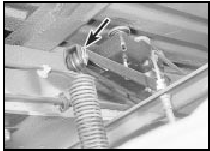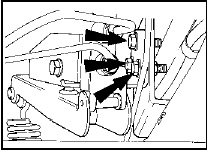Load apportioning valve P100 models) - removal and refitting
Caution: Refer to the precautions in Section 1.
Removal
1 Chock the front wheels, jack up the rear of
the vehicle and support on axle stands (see
“Jacking and Vehicle Support”).
2 The load apportioning valve is located on the right-hand side of the vehicle underbody above the axle.
3 Remove the spring clip and clevis pin, and detach the spring from the valve operating lever (see illustration).

24.3 Remove the spring clip (arrowed) and clevis pin from the valve operating
lever
4 Place a suitable container beneath the valve to catch spilt fluid, then unscrew the union nuts and disconnect the fluid pipes.
Plug the open ends of the pipes and valve to prevent fluid leakage and dirt ingress.
5 Unscrew the three securing nuts and bolts from the valve mounting bracket, and remove the valve assembly (see illustration).

24.5 Load apportioning valve securing bolts (arrowed)
Refitting
6 Refitting is a reversal of removal, but note
that the fluid inlet pipe from the master cylinder
must be connected to the lower valve port, and
the fluid outlet pipe to the rear brakes must be
connected to the upper valve port.
7 On completion, bleed the rear hydraulic circuit and check the valve adjustment.
See also:
Safety restraints for children
See the following sections for directions on how to properly use safety
restraints for children. Also see Air bag supplemental restraint system
(SRS) in this chapter for special instructions about u ...
Hydraulic pipes and hoses - renewal
Note: Before starting work, refer to the
warning at the beginning of Section 3
concerning the dangers of hydraulic fluid.
1 Always disconnect a flexible hose by
prising out the spring anchor clip ...
Cylinder head - inspection and renovation
Note: On engines fitted with hardened valve
seats for use with unleaded petrol, valve and
valve seat grinding and recutting cannot be
carried out without the use of specialist
equipment. Consult a ...
